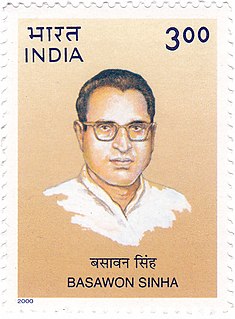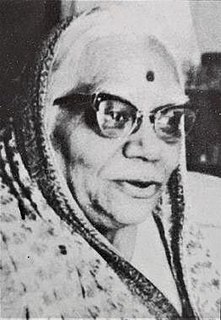Leadership
General Secretaries
- 1988: Jamshedpur Gopeshwar
- 1998: Nazrul Islam Khan
- Laxman Basnet
Presidents
- 1988: Savumiamoorthy Thondaman
- G. Sanjeeva Reddy
| Full name | South Asian Regional Trade Union Council |
|---|---|
| Founded | 1988 |
The South Asian Regional Trade Union Council (SARTUC) is a federation of national trade union centers whose geographic scope covers South Asia. SARTUC's mission is to promote workers' rights within its member nations. [1]
The South Asian Regional Trade Union Council was formed in January 1988 by some of the affiliates of the International Confederation of Free Trade Unions (now the ITUC) in countries belonging to the South Asian Association for Regional Cooperation (SAARC)—Afghanistan, Bangladesh, Bhutan, India, Maldives, Nepal, Pakistan and Sri Lanka. The Indian trade union center Indian National Trade Union Congress and Hind Mazdoor Sabha, were the founding members of SARTUC. [2]
Nazrul Islam Khan (then-president of the Bangladesh Metal Workers' Federation) was SAR-TUC's general-secretary in 2003. [3]

The International Confederation of Free Trade Unions (ICFTU) was an international trade union. It came into being on 7 December 1949 following a split within the World Federation of Trade Unions (WFTU), and was dissolved on 31 October 2006 when it merged with the World Confederation of Labour (WCL) to form the International Trade Union Confederation (ITUC).

The World Federation of Trade Unions (WFTU) is an international federation of trade unions. WFTU was established in 1945 to replace the International Federation of Trade Unions. Its mission was to bring together trade unions across the world in a single international organization, much like the United Nations. After a number of Western trade unions left it in 1949, as a result of disputes over support for the Marshall Plan, to form the International Confederation of Free Trade Unions, the WFTU was made up primarily of unions affiliated with or sympathetic to communist parties. In the context of the Cold War, the WFTU was often portrayed as a Soviet front organization. A number of those unions, including those from Yugoslavia and China, left later when their governments had ideological differences with the Soviet Union.

Trade Unions in India are registered and file annual returns under the Trade Union Act (1926). Statistics on Trade Unions are collected annually by the Labour Bureau of the Ministry of Labour, Government of India. As per the latest data, released for 2012, there were 16,154 trade unions which had a combined membership of 9.18 million. The Trade Union movement in India is largely divided along political lines and follows a pre-Independence pattern of overlapping interactions between political parties and unions. The net result of this type of system is debated as it has both advantages and disadvantages. Bharatiya Mazdoor Sangh is the Largest Trade union of India.
The ITUC Regional Organisation for Asia and Pacific is a regional organisation of the International Trade Union Confederation representing trade unions from countries in Asia and Oceania. It has 40 affiliated organisations in 28 countries, claiming a membership of 30 million people.

The Hind Mazdoor Sabha is a national trade union centre in India.

Basawon Singh or Basawan Singh also known as Basawon Sinha, was an Indian independence activist and a campaigner for the rights of the underprivileged, industrial labourers and agricultural workers. He spent a total of 18 and a half years in prisons in British India as a consequence of his support for independence and he was committed to democratic socialism. Along with Yogendra Shukla, he was a founder member of the Congress Socialist Party in Bihar. Among his revolutionary colleagues and friends he was called lambad because of being very tall.

The ICFTU Asia and Pacific Regional Organisation (APRO) was a regional organisation of the International Confederation of Free Trade Unions (ICFTU), representing trade unions from countries in Asia and Oceania.

Maniben Kara (1905-1979) was an Indian social worker and trade unionist. She was a founder member of the Hind Mazdoor Sabha and served as its president. She was honoured by the Government of India in 1970 with Padma Shri, the fourth highest Indian civilian award.
Shibban Lal Saxena was a former Indian politician and Freedom Fighter. He was son of late Shri Chhotey Lal Saksena and his uncles'were late Shri Shyam Sunder Lal Saksena and late Shri Ram Sunder Lal Saksena. He was born on 13 July 1906 to a wealthy Kayastha Family at Agra.
Textile and clothing trade unions are labor unions that represent workers in the textile industry and garment industry. A partial list is as follows.

Sebastian Cyril Constantine Anthony Pillai was an Indian trade unionist, politician and Member of Parliament.
Prabhat Chandra Bose generally referred to as P. C. Bose, was a noted freedom fighter, labor activist and politician from Dhanbad.
All India Railwaymen's Federation (AIRF) is the largest trade union in the Indian Railways with a membership of 1.4 million. AIRF was the first union founded in Indian Railways in 16 Feb1925. It is affiliated with the socialist trade union center Hind Mazdoor Sabha.
Deben Sen, was an Indian trade union activist.
Sramik Karmachari Oikya Parishad is a national federation of 16 unions in Bangladesh which collectively represent 90 percent of the unionized labor force in Bangladesh.
Jamshedpur Gopeshwar, usually known simply as Gopeshwar, was an Indian trade unionist and politician.
| This article related to an Asian trade union is a stub. You can help Wikipedia by expanding it. |